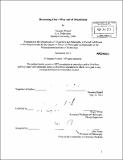Reasoning one's way out of skepticism
Author(s)
Rinard, Susanna (Susanna Margaret)
DownloadFull printable version (5.183Mb)
Other Contributors
Massachusetts Institute of Technology. Dept. of Linguistics and Philosophy.
Advisor
Roger White.
Terms of use
Metadata
Show full item recordAbstract
Many have thought that it is impossible to rationally persuade a skeptic that we have knowledge of the external world. My dissertation aims to show that this can be done. In chapter one I consider a common reason for complacency about skepticism. Many contemporary philosophers reject the skeptic's conclusion on the grounds that mere philosophical argument can't rationally undermine common sense. I consider the standard arguments for this view and find them wanting. I then argue in a positive vein that philosophy can overturn common sense, on the assumption (shared by my opponents) that science can overturn common sense. That the skeptic can't simply be ignored makes the task of convincing the skeptic all the more urgent. In the first half of chapter two I aim to convince the external world skeptic that her position is irrational. Whoever accepts the argument for external world skepticism is, I claim, thereby committed to accepting skepticism about the past, which commits them to accepting a complex argument for skepticism about complex reasoning. But if one accepts this argument, one's position is self-undermining in the following sense: one believes a proposition P while at the same time believing that one should not believe P. This combination of beliefs is not rational. But it is forced on anyone who accepts the argument for external world skepticism, making it irrational to accept that argument. I concluded in the first half of chapter two that one shouldn't believe skepticism, but this leaves open the possibility that one should suspend judgment on skepticism. Next I argue that this position is also irrational. However, this still doesn't quite establish that we should believe that skepticism is false, for we need to rule out the possibility that we are caught in an epistemic dilemma: that all attitudes one could take toward skepticism would be irrational. I go on to argue that epistemic dilemmas are not possible. With this claim in place, it follows that we ought to believe that skepticism is false. So it is possible to reason one's way out of skepticism.
Description
Thesis (Ph. D.)--Massachusetts Institute of Technology, Dept. of Linguistics and Philosophy, September 2011. Cataloged from PDF version of thesis. "September 2011." Includes bibliographical references (p. 51-53).
Date issued
2011Department
Massachusetts Institute of Technology. Department of Linguistics and PhilosophyPublisher
Massachusetts Institute of Technology
Keywords
Linguistics and Philosophy.